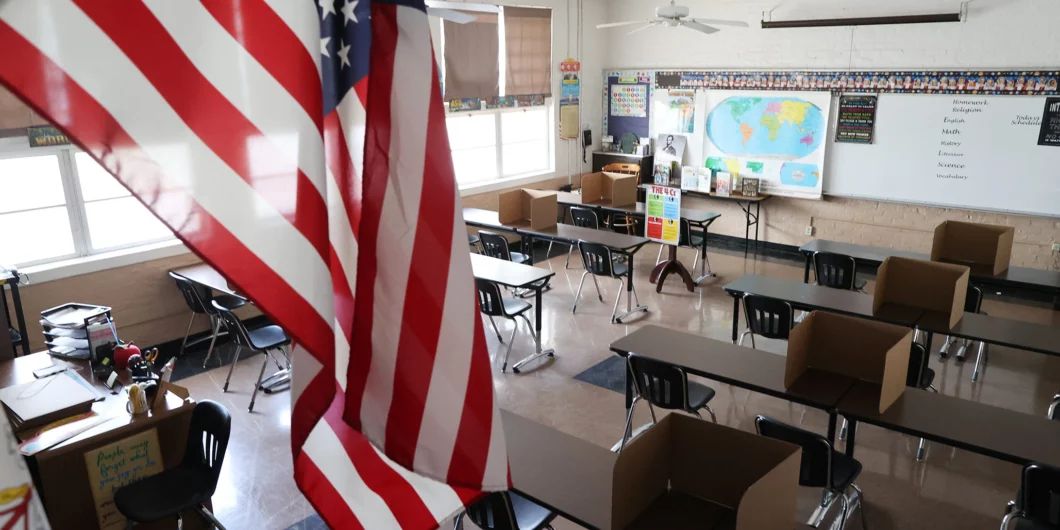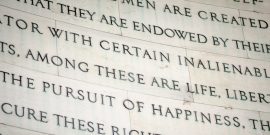One can hardly deny that natural rights arguments of a Lockean strain were a key part of that fateful period from 1760-1776.
What’s Un-American About Accommodation?
Back in the days when it was thought more admirable to act than to criticize, the term “Monday-morning quarterback” was a derisory term for the person who sat in the stands or on his couch during the game but, after it was over, was quick to say what plays should have been called and how they ought to have been executed. This was the term that leapt to mind in reading John Fonte’s recent “weekend long-read” essay in American Greatness, “No to Conservative Accommodationism,” directed particularly at the two of us, deriding us for participating in the Educating for American Democracy (EAD) initiative in 2019–21. You wouldn’t know from the essay that the project grew from a call for proposals issued by the National Endowment for the Humanities chairman’s office under Trump-appointee Jon Peede and involved participation by the DeVos-headed Department of Education. The team whose proposal won the competition was led by liberal Harvard professor Danielle Allen and conservative Arizona State University’s Paul Carrese (a co-author of this essay), among other scholars, and was facilitated by iCivics, an organization founded by Sandra Day O’Connor that was at the time the leading producer of civics-education materials.
Was the intention to produce something bipartisan? Emphatically, yes—as we have already responded to other conservative denunciations of our participation in such an effort. The Constitution has worked to hold Americans together for well over two hundred years because it was and is a bipartisan document, produced by compromise or, to use Fonte’s term, accommodation. Different people, different groups, and different parties interpret the Constitution variously, as they have different accounts of American history and different visions of America’s future. The genius of the Constitution has been to provide shared institutions through which debates can take place and choices made, as well as shared ideals to which Americans aspire even when we differ. If civics education cannot address these matters, if it is nothing but partisan indoctrination, how can we expect our constitutional framework to endure?
Partisan interpretations of the Constitution, the political system more generally, and the country’s history are inevitable and, given the inevitability of partisanship, we welcome the development of conservative curricula like those mentioned by Fonte as an alternative to progressive curricula that abound. The point of the EAD framework is to point out the topics that ought to be covered and to raise the questions that ought to be asked: not only what have been the country’s failings and what are situations that call for reform, but also what is the lasting significance of the nation’s founding documents and what are the achievements of American democracy that made possible the country’s growth and greatness. No doubt progressives and conservatives will supply different, even opposite answers, to these questions, but just as conservative teachers can be asked to confront unpleasant facts about slavery and conquest, so progressives ought to acknowledge the political liberty the Declaration and the Constitution secured and the prosperity the free market has achieved. EAD asks that these matters all be laid upon the table so that students are aware of the whole range of questions, recognizing of course that teachers will interpret matters differently, as will the students themselves.
We ask conservatives to recognize that the denounce-and-obstruct strategy is likely to fail in most venues, and that instead conservatives should be at the table to ensure that national reform efforts on civics pull the national debate, and subsequent state and local efforts, toward a reasonable center and a healthier common American culture.
That said, we admit that Fonte has a point in noting that EAD would be better if, as conservative contributors, we’d been able to keep it more intellectually balanced, not so dominated by left-progressive thought, and more patriotic and grateful toward America. We wish we’d succeeded in incorporating some favorable references to recent conservative sources like Wilfred McClay’s Land of Hope, or ideas and questions like the following from earlier drafts:
- A healthy constitutional democracy always demands reflective patriotism. In times of crisis, it is especially important that “We the People” unite love of country with clear-eyed wisdom about our successes and failures in order to chart our forward path.
- A self-governing people must constantly attend to historical and civic education: to the process by which the rising generation owns the past, takes the helm, and charts a course toward the future. The United States is the longest-lived constitutional democracy in the world, approaching its 250th anniversary in 2026. This occasion calls for both celebration and fresh commitment to the cause of self-government for free and equal citizens in a diverse society.
- The virtue of civic friendship reminds us that we should all regard one another as fellow Americans capable of sharing ideals, principles, and constitutional forms of self-government even as we vigorously debate our philosophical or policy differences.
- Passing on a love and understanding of American constitutional democracy to future generations is an urgent civic necessity. We are all responsible for cultivating in ourselves and the young the reflective patriotism needed to navigate the dangerous shoals we now face as we chart a course between cynicism and nostalgia.
- What is meant by “the Laws of Nature and Nature’s God” and by the “Creator” in the Declaration of Independence? What other ideas of religion, philosophy, or law are involved in the Declaration?
- Why does the Declaration of Independence close with the signers stating they “mutually pledge” their “lives, fortunes, and sacred honor”? Why does Lincoln ask Americans to be “dedicated” to ensuring “a new birth of freedom”? Why did many abolitionists, women’s suffrage advocates, and civil rights advocates not lose faith in what Martin Luther King Jr. called “the American dream” of equal justice even when they long had been denied justice?
- How did the founders of the United States draw on the history of prior experiments with free government around the world and over history as they pursued the Revolution and designed the Constitution?
- What role is played in my own life and in American society by values and virtues such as patriotism, civic duty, toleration, respect, dignity, civil disagreement, civic friendship, courage, justice, initiative, service, and volunteerism?
- What vision for foreign relations did Washington set out in his Farewell Address?
- Did Lincoln intend a “new birth of freedom” as a refinement of, or revolution against, the founding of the United States? Did the Great Awakenings of the nineteenth century or the rise of evangelicalism in the twentieth century change American culture in ways that add up to a refounding?
- How can we help students become engaged citizens who also sustain civil disagreement, civic friendship, and thus American constitutional democracy?
Oh, wait—all of the above passages, and the reference to McClay, actually are in the published EAD Report and the Roadmap. Did Mr. Fonte know these passages, and many others like them, occur throughout EAD, but wasn’t fair-minded enough to share that with readers of American Greatness? Or has he not studied these carefully written documents that were the product of discussions across nearly two years of effort? We can understand why Danielle Allen replied more gently and graciously, as an avowed Democrat and liberal-progressive, to Mr. Fonte’s conservative denunciation of EAD. As fellow conservatives whom he declares un-American, we can reasonably suggest that he should raise his game and stop embarrassing our side, so that conservatives can be seen as something other than cranks.
Having mostly indulged a caricature of this serious national study and two of its conservative leaders, it seems Mr. Fonte’s only constructive response is to cite such purely conservative arguments and curricula as produced by Hillsdale College, the 1776 Commission Report, and the National Association of Scholars. We have argued elsewhere that these are worthy contributions to American civic education and the national debate about better approaches, but also that such efforts, however effective where they have been adopted, would leave the great bulk of America’s public school children in non-adopting districts and schools with deficient citizenship preparation. The culture-war approach some conservatives have pursued for over three decades may succeed in some red states, but it is unlikely to pull anything like a plurality let alone a majority of K-12 districts and schools across America out of the defensive crouch that avoids any improvements to civics education for fear of getting caught in the crossfire of precisely the kind Fonte delivers. We co-led the EAD effort, in contrast, to be part of the broader American saga of seeking constructive paths toward reaching and swaying our fellow citizens to seek a higher quality of, and priority for, civics.
The dangerously pathetic condition of America’s civic health, and the dearth of both civic knowledge and patriotism among perhaps a majority of our youth, suggests that a focus on preventing leftist harms has only helped to produce an American educational system that undervalues civics and history education. The test results for civics and US history just announced in “the nation’s report card” (the NAEP, National Assessment of Educational Progress) for 2022 show that the long-term decline of civic education combined with the disruptions to schooling caused by COVID and pandemic policies have produced even more terrible scores than the last assessment in 2018. Those dismal results were a main rationale for the EAD study itself: that something new ought to be tried beyond the predominant polarization.
In 2018 fewer than a quarter of eighth graders were proficient in civics or in US history; the 2022 assessment shows that the already-small portion of students who are adequately prepared for informed citizenship is actually shrinking. We ask conservatives to recognize that the denounce-and-obstruct strategy is likely to fail in most venues and that instead, conservatives should be at the table to ensure that national reform efforts on civics pull the national debate, and subsequent state and local efforts, toward a reasonable center and a healthier common American culture. Carefully read, the EAD study makes a start in that direction, and we think conservative participation even in places where the public schools are under liberal administration can be constructive. In these matters, when working together with fellow citizens, accommodation is not a dirty word.


